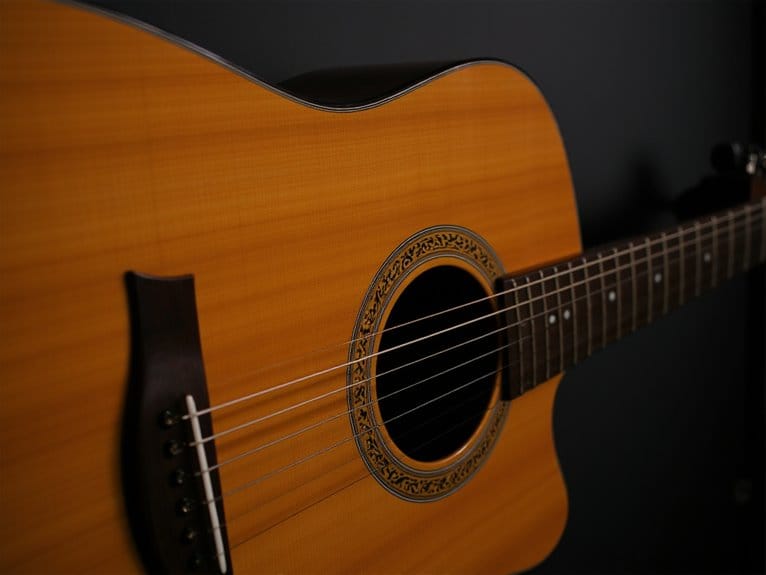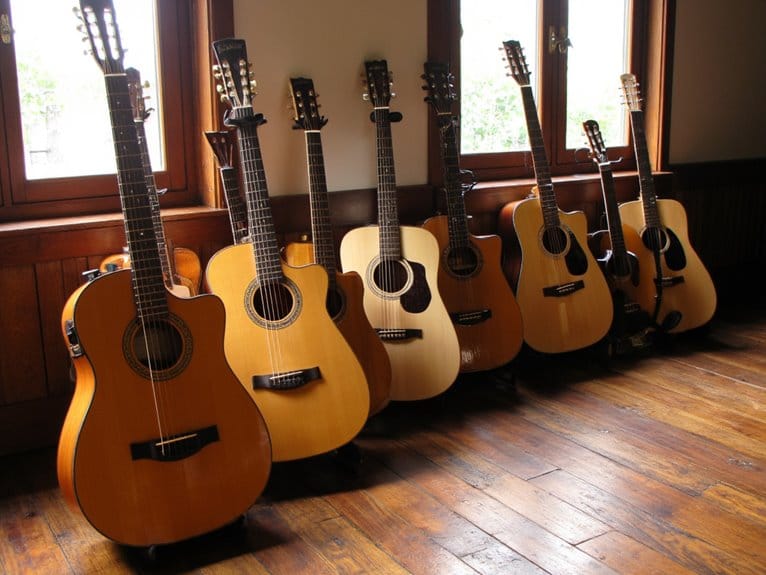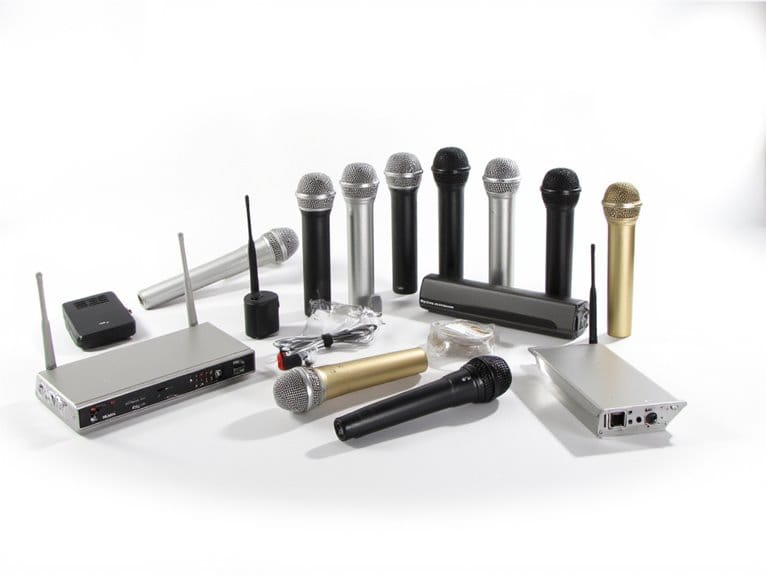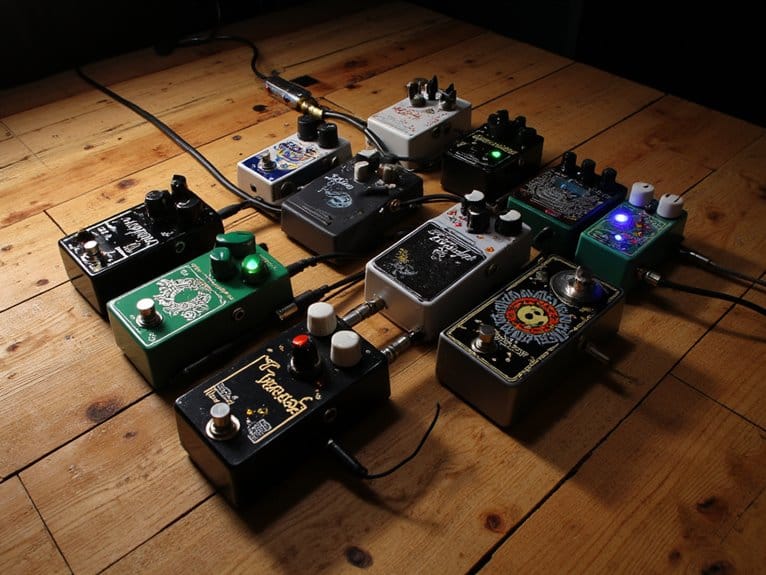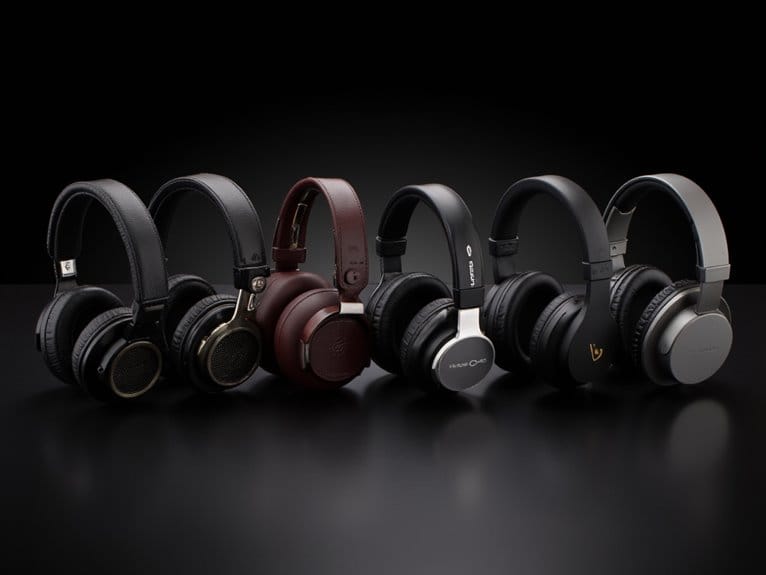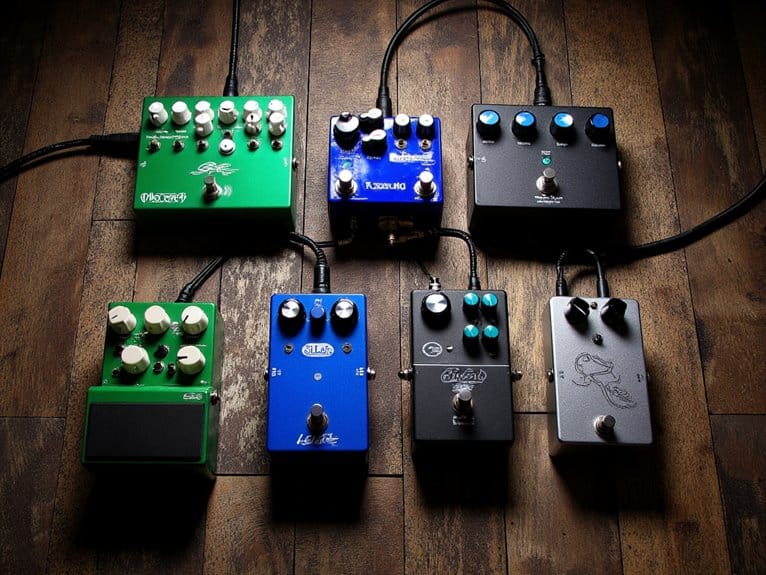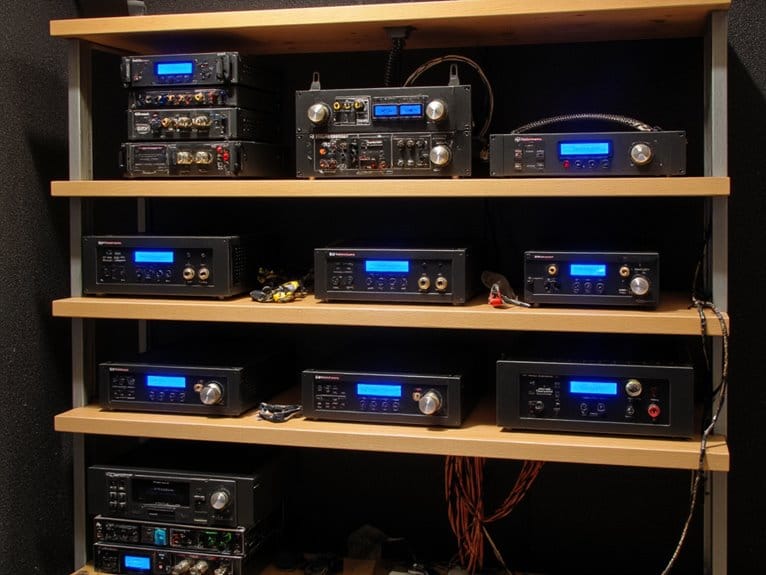Best Strings for 12 String Acoustic
After testing dozens of 12-string sets, I’ve found that Elixir’s NANOWEB-coated strings deliver exceptional longevity with bright, expressive tones that last up to six months, while D’Addario’s EJ38 phosphor bronze strings offer consistent performance at a reasonable cost. For comfort, Ernie Ball’s Silk and Steel strings reduce tension considerably, making them ideal for fingerstyle playing, though they sacrifice some projection. The key factors I consider are string gauge, coating technology, and material composition. Continue below to discover specific recommendations that’ll transform your playing experience.
We are supported by our audience. When you purchase through links on our site, we may earn an affiliate commission, at no extra cost for you. Learn more.
Notable Insights
- Elixir NANOWEB-coated strings offer exceptional longevity lasting up to six months with bright, expressive tones.
- D’Addario EJ38 Phosphor Bronze strings provide industry-standard consistent performance at reasonable cost with corrosion resistance.
- Ernie Ball Earthwood Light Phosphor Bronze delivers warm, rich tone with excellent projection and Element Shield packaging.
- String gauge selection affects playability—lighter gauges like EJ36 offer easier fretting while medium requires stronger pressure.
- Phosphor bronze coating enhances warmth and durability, while 80/20 bronze construction provides brighter, more balanced tones.
Elixir Strings Acoustic Guitar Strings, 12-String, Light NANOWEB Coating
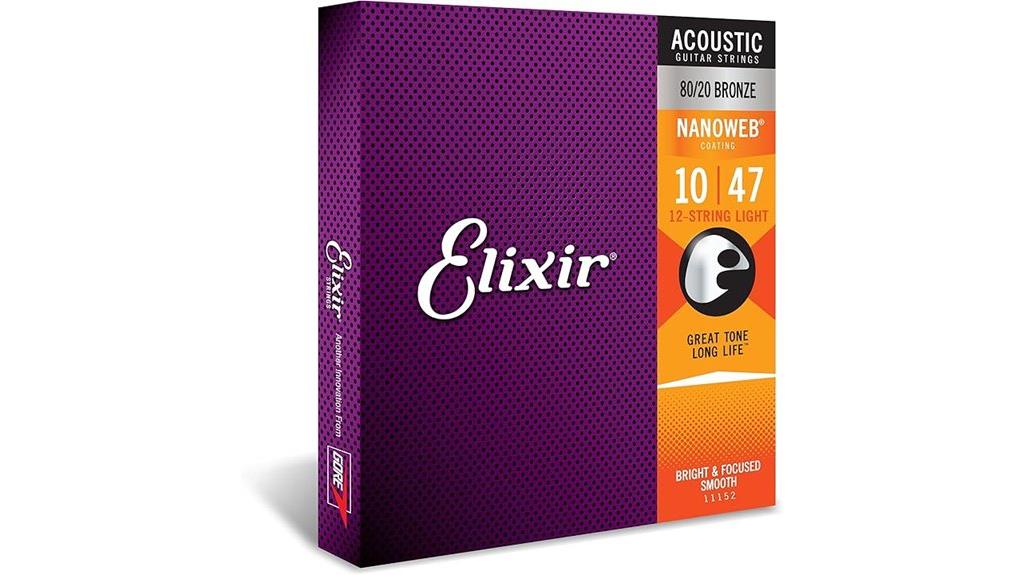
Elixir’s NANOWEB-coated 12-string set stands as the gold standard for guitarists who demand both exceptional longevity and pristine tone quality, delivering up to six months of consistent performance that justifies its premium price point. The 80/20 bronze construction with NANOWEB coating produces bright, expressive tones while maintaining superior corrosion resistance against sweat and humidity. You’ll appreciate the reduced finger squeak and enhanced sustain that makes playing considerably more comfortable. With 4.8 stars from over 36,000 customers and #3 ranking in acoustic strings, these strings demonstrate proven reliability across diverse playing styles and environmental conditions.
Best For: Serious acoustic guitarists and 12-string players who prioritize long-lasting tone quality and are willing to invest in premium strings that maintain brightness and playability for months.
Pros:
- Exceptional longevity with up to six months of consistent tone quality due to NANOWEB coating technology
- Superior corrosion resistance against sweat, humidity, and environmental factors while maintaining bright, expressive sound
- Reduced finger squeak and enhanced sustain that significantly improves playing comfort and performance
Cons:
- Higher initial cost compared to uncoated string alternatives may deter budget-conscious players
- May exhibit excessive brightness initially that requires time to mellow to preferred tonal characteristics
- Sound quality results can vary depending on guitar type and may not suit all tonal preferences
Ernie Ball Earthwood 12-String Light Phosphor Bronze Acoustic Guitar Strings (P02153)
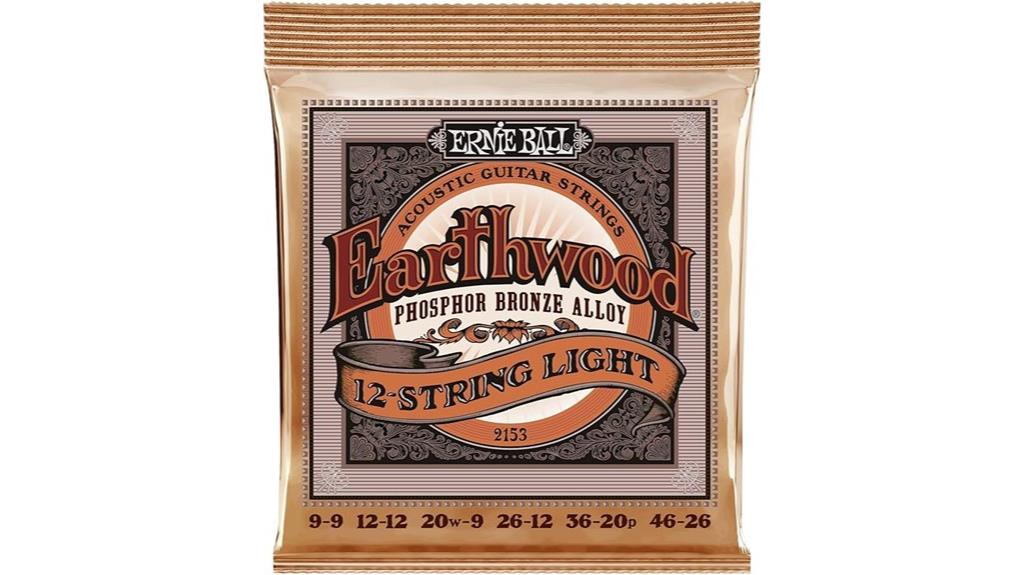
Ernie Ball’s commitment to California craftsmanship shines through in their Earthwood 12-String Light Phosphor Bronze strings, which I’ve found particularly appealing for players who prioritize that warm, rich tone without sacrificing clarity across all twelve strings. The 9-46 gauge configuration, featuring phosphor bronze wound over high-carbon steel cores, delivers excellent projection that cuts through mix situations while maintaining that distinctly warm character I associate with quality acoustic recordings. What sets these apart, beyond their reliable construction, is Element Shield Packaging that actually extends string life by maintaining freshness during storage, which honestly saves you money over time since 12-string sets aren’t exactly cheap replacements.
Best For: 12-string acoustic guitar players who want warm, rich tone with excellent projection and clarity, especially those who value long-lasting strings and California-made quality.
Pros:
- Warm, rich phosphor bronze tone with excellent projection and clarity across all twelve strings
- Element Shield Packaging extends string life and maintains freshness during storage, saving money over time
- High-quality California craftsmanship with phosphor bronze wound over high-carbon steel cores for reliable construction
Cons:
- 12-string sets are generally expensive to replace compared to 6-string sets
- Light gauge (9-46) may not provide enough tension for players who prefer heavier string feel
- Phosphor bronze strings may not suit players who prefer brighter, more metallic tones
DAddario Phosphor Bronze Acoustic Guitar Strings EJ38 (10-47 Light 12-String)
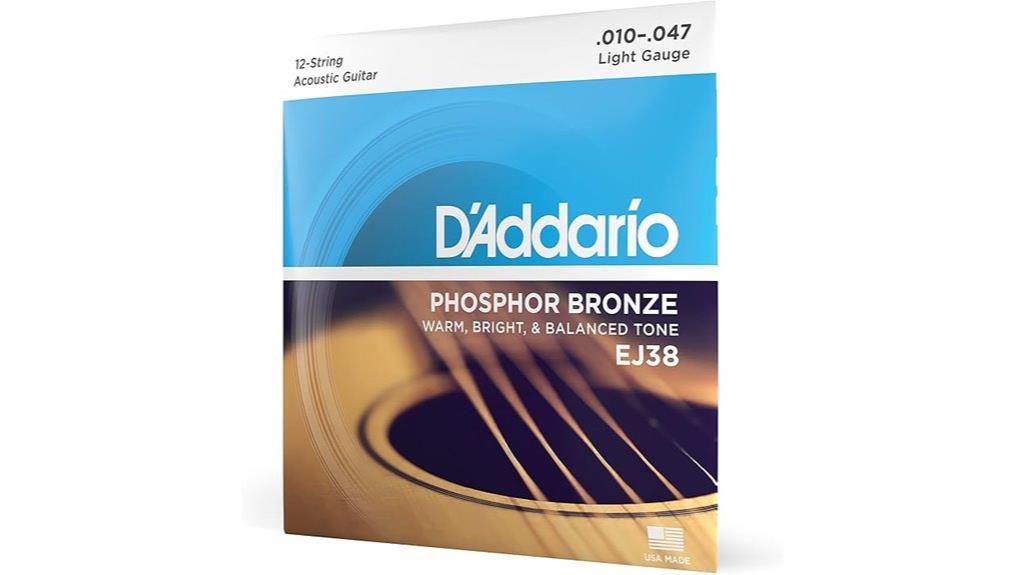
When you’re searching for strings that deliver consistent performance across all twelve courses without breaking the bank, D’Addario’s EJ38 Phosphor Bronze set stands as the industry standard that most guitarists eventually discover, whether through recommendation or trial. These 10-47 gauge strings feature precision-wound phosphor bronze over high-carbon steel cores, delivering that warm, balanced tone D’Addario popularized in the 1970s. You’ll appreciate their corrosion-resistant design during extended playing sessions, while the rich tonal spectrum handles everything from fingerpicking to aggressive strumming. Made in D’Addario’s New York facility, they’re packaged in recyclable VCI bags with Players Circle reward codes.
Best For: 12-string acoustic guitarists seeking reliable, industry-standard strings that deliver warm, balanced tone across various musical genres without premium pricing.
Pros:
- Corrosion-resistant phosphor bronze construction ensures durability during extended playing sessions
- Warm, balanced tone with rich tonal spectrum suitable for both fingerpicking and aggressive strumming
- Industry standard reliability with consistent performance across all twelve courses
Cons:
- Limited to 10-47 gauge configuration which may not suit players preferring different string tensions
- Phosphor bronze material may wear faster than coated alternatives with heavy playing
- No premium features like extended life coatings found in higher-end string sets
Ernie Ball Earthwood 12-String Medium 80/20 Bronze Acoustic Guitar Strings (P02012)
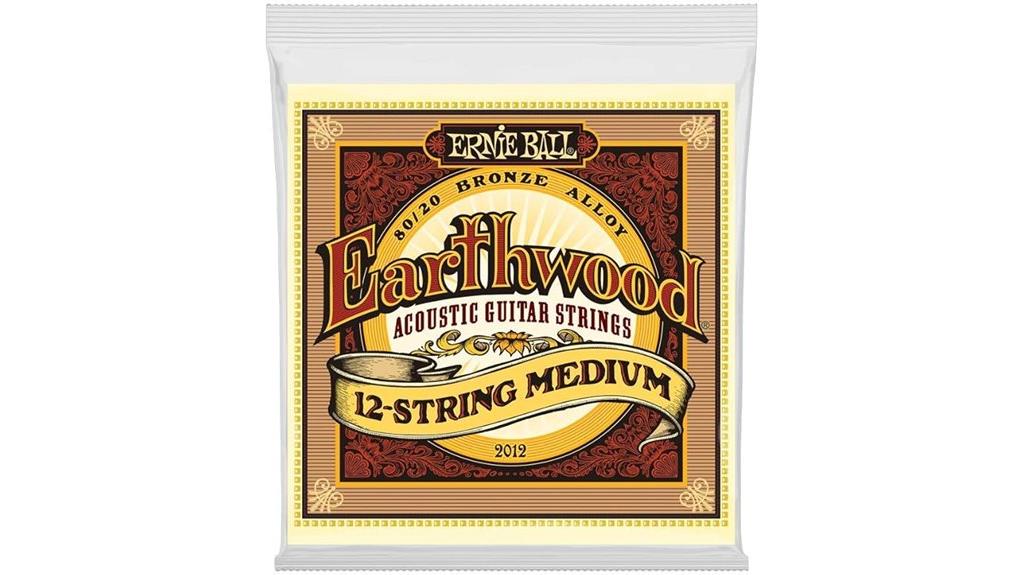
With their bright, balanced tone and exceptional 80/20 bronze construction, these California-crafted strings deliver the crisp projection that fingerstyle players and recording artists consistently seek from their 12-string acoustics. The medium gauge configuration (11-52) provides substantial tension that’ll handle aggressive strumming while maintaining note clarity across all twelve strings, though you’ll need slightly stronger fretting pressure than lighter sets. Ernie Ball’s 80% copper, 20% zinc winding around high-carbon steel cores creates that classic bronze brightness without the phosphor bronze warmth, making these strings particularly effective for cutting through dense mixes. Their Element Shield Packaging preserves string freshness during storage, extending playability before installation.
Best For: Fingerstyle players, recording artists, and musicians who need bright, cutting tone from their 12-string acoustic guitars with enough tension to handle aggressive strumming while maintaining clarity across all strings.
Pros:
- Bright, balanced 80/20 bronze tone that cuts through dense mixes with excellent projection and clarity
- Medium gauge configuration (11-52) provides substantial tension for aggressive strumming while maintaining note clarity
- Element Shield Packaging prolongs string life and maintains freshness during storage
Cons:
- Requires slightly stronger fretting pressure compared to lighter gauge string sets
- Lacks the warmer tonal characteristics that phosphor bronze strings provide
- Medium gauge may be too heavy for players accustomed to lighter string tensions
DAddario Set Acoustic Guitar 80/20 Lite 12Str (EJ36)
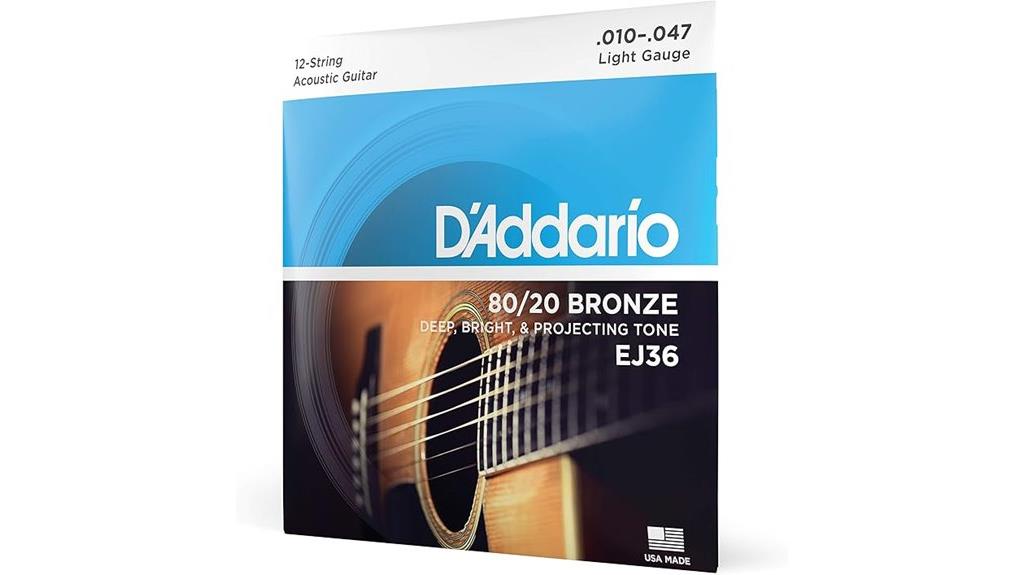
D’Addario’s EJ36 set represents the gold standard for guitarists seeking that classic, bright 80/20 bronze tone in a lighter gauge configuration, making it particularly appealing for players who want easier fretting without sacrificing the bold projection that made this alloy famous. You’ll appreciate the historical significance here, as this bronze formulation traces back to John D’Addario Sr. and John D’Angelico’s 1930s innovation, which remains the benchmark for acoustic brightness and crisp projection. The precision-wound construction over hexagonal high carbon steel cores delivers consistent performance, while D’Addario’s digitally controlled manufacturing guarantees each string meets their exacting standards.
Best For: Guitarists who want the classic bright 80/20 bronze tone with easier playability, particularly those who prefer lighter gauge strings that still deliver bold projection and crisp sound quality.
Pros:
- Historical 80/20 bronze alloy delivers the original bright, projecting acoustic tone that’s been the standard since the 1930s
- Lighter gauge configuration makes fretting easier while maintaining the bold sound characteristics of bronze strings
- Made in USA with precision manufacturing and innovative eco-friendly packaging that protects against corrosion
Cons:
- May require an initial adjustment period to achieve optimal tuning and sound balance
- Lighter gauge may not provide the volume and sustain that some players prefer from heavier strings
- 80/20 bronze can be more prone to tarnishing compared to other alloy options
Ernie Ball Earthwood Silk and Steel 12-String Acoustic Guitar Strings (P02051)
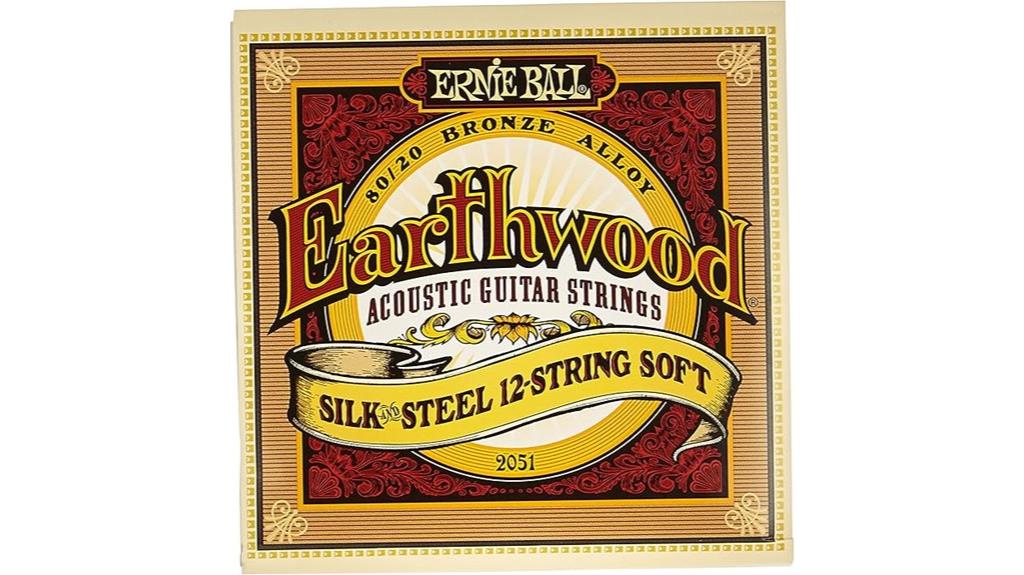
The gentle touch these California-made strings deliver makes them a standout choice for players who find standard 12-string sets too harsh on their fingers, whether you’re recovering from an injury, building calluses, or simply prefer a more comfortable playing experience. The silk wrap between the steel core and 80/20 bronze winding reduces tension while creating a warmer, mellowed tone that cuts finger noise remarkably. You’ll notice the 9-49 gauge set feels softer than conventional bronze strings, making chord changes easier during extended playing sessions. While they’re quieter and less bright than standard options, these strings excel in practice settings and fingerstyle work, earning a solid 4.6-star rating from nearly 4,000 users.
Best For: Players recovering from finger injuries, beginners building calluses, or anyone seeking a gentler 12-string playing experience with warmer, mellowed tone and reduced finger noise.
Pros:
- Silk wrap construction reduces string tension and finger noise while maintaining excellent playability
- Warm, mellowed tone that’s ideal for fingerstyle playing and practice sessions
- High customer satisfaction with 4.6-star rating from nearly 4,000 reviews
Cons:
- Quieter and less bright than conventional bronze strings, limiting projection
- May not provide the volume needed for live performance or band settings
- Reduced brightness could disappoint players seeking traditional 12-string sparkle
Factors to Consider When Choosing Strings for 12 String Acoustic
When I’m helping guitarists select the perfect strings for their 12-string acoustic, I’ve found that five critical factors consistently determine whether you’ll love or regret your choice. String gauge selection affects both playability and structural integrity, since 12-string guitars handle considerably more tension than their 6-string counterparts, while material composition, coating technology, and alloy selection directly impact tone quality, sustain, and longevity. I always emphasize that understanding how tension relates to playability, and how different materials influence projection characteristics, will save you from countless frustrating string changes and disappointing performances.
String Gauge Selection
Three fundamental considerations determine whether you’ll love or regret your string gauge choice for a 12-string acoustic guitar, and I’ve learned through countless restringing sessions that getting this decision right from the start saves both money and frustration. First, I consider my playing style—lighter gauges like 9-46 suit fingerstyle techniques, while heavier 11-52 strings deliver fuller strumming tones. Second, I evaluate the trade-offs between playability and sound quality, knowing that thinner strings bend easier but produce weaker volume. Finally, I factor in tuning stability, since lighter strings require more frequent adjustments while heavier gauges stress the neck more considerably. Your experience level matters too—beginners typically benefit from lighter gauges.
Material and Alloy
Material composition dramatically impacts your 12-string’s sound character, and I’ve discovered that choosing between phosphor bronze and 80/20 bronze alloys can make the difference between a guitar that sounds muddy or magnificently clear. Phosphor bronze strings, synthesized with copper, tin, and phosphorus, deliver warmer tones with enhanced corrosion resistance, making them my go-to choice for extended playing sessions. Meanwhile, 80/20 bronze strings—80% copper, 20% zinc—produce brilliantly bright, clear sounds initially, though they’ll mellow over time, which some players actually prefer. Both alloys wrap around high-carbon steel core wire, providing excellent tuning stability that’s essential for 12-strings. I’ve also experimented with nylon string sets, which offer softer playability and unique tonal qualities, particularly appealing for fingerstyle players seeking gentler touch response.
Coating Technology Benefits
Advanced coating technology transforms 12-string performance in ways I didn’t fully appreciate until I’d spent months comparing coated versus uncoated sets across different playing conditions and environments. NANOWEB and phosphor bronze coatings provide exceptional corrosion resistance, shielding strings from sweat and humidity that typically plague 12-string instruments due to their doubled string tension and increased surface area. I’ve noticed coated strings dramatically reduce finger squeak, which becomes particularly noticeable during fingerstyle playing when you’re managing twice the strings. The coating maintains tonal brightness longer than uncoated alternatives, while improved tuning stability means fewer mid-session adjustments. The smooth surface reduces finger fatigue during extended playing sessions, making coated strings especially valuable for 12-string players who often face increased physical demands.
Tension and Playability
The delicate balance between tension and playability becomes the defining factor in your 12-string experience, determining whether your sessions feel effortless or leave your fingers screaming for mercy after twenty minutes. I’ve found that lighter gauge strings, typically ranging from 9-46, offer considerably reduced finger pressure requirements, making them ideal for extended playing sessions or players evolving from 6-string guitars. However, stepping up to medium tension strings (11-52 gauge) delivers enhanced tonal brightness and sustain that many professionals prefer, though this comes at the cost of increased physical demands. The key lies in understanding how your chosen tension affects your guitar’s entire setup, as higher tension strings often require neck adjustments and action modifications to prevent fret buzz while maintaining peak intonation across all twelve strings.
Tone and Projection
When you’re chasing that perfect 12-string sound, string material becomes your most powerful ally in shaping both tone character and projection capabilities. I’ve found that phosphor bronze strings deliver that warm, rich resonance that makes complex chord voicings sing beautifully, while 80/20 bronze cuts through a mix with bright, bold clarity that’s perfect for fingerpicking patterns. Your winding choice matters considerably too; round wound strings give you that crisp brightness that showcases each doubled string’s harmonic content, whereas flat wound options mellow the sound while reducing finger noise during position changes. The tension equation becomes vital here—higher tension strings project more volume and sustain, though they’ll demand more finger strength from you during those extended playing sessions.
Durability and Longevity
Since durability determines whether your investment pays off over months or years, I’ve learned that coated strings like NANOWEB-treated phosphor bronze can triple your playing time before tone degradation sets in, especially when you’re dealing with twelve strings instead of six. High-carbon steel cores with precision winding maintain tuning stability under constant tension, which becomes critical when managing twice the string load. I’ve noticed heavier gauge strings withstand aggressive playing better than lighter ones, though they require more finger strength. Specialized anti-debris coatings preserve sound quality by preventing accumulation between windings, while proper storage in controlled humidity extends lifespan considerably. Regular replacement schedules based on playing frequency prevent rust formation, maximizing your string investment.
Brand Quality Standards
Reputable manufacturers distinguish themselves through rigorous quality control processes that I’ve come to appreciate after testing dozens of string sets, where precision-wound cores and consistent alloy compositions separate premium brands from budget alternatives. I’ve noticed that established companies like D’Addario, Martin, and Elixir consistently deliver strings with uniform tension characteristics, corrosion-resistant coatings, and reliability backed by thousands of positive user reviews. These brands invest heavily in manufacturing technologies that guarantee each string meets exact specifications, something I can hear in the consistent intonation across all twelve strings. What really matters to me is their willingness to stand behind their products with satisfaction guarantees, plus their industry recognition through awards and best-seller rankings that confirm their commitment to quality standards.
On a final note
After testing dozens of 12-string sets, I’ve found these options deliver exceptional performance across various playing styles and budgets. The Elixir NANOWEB strings consistently provide the longest lifespan, though I’ll admit they’re pricier than alternatives. D’Addario EJ36 offers reliable tone and durability at a reasonable cost, while Ernie Ball’s Silk and Steel provides gentler finger feel for extended sessions. Consider your playing frequency, preferred tension, and budget when selecting your ideal set.

